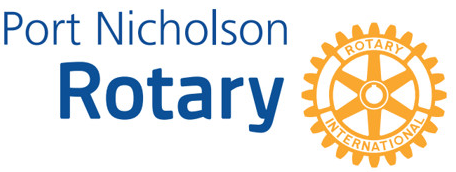
Dr John McDermott, well known NZ macroeconomist, addressed the club on 25 January with reference to the things that can happen in an economy when external events such as a pandemic can drive consumers, businesses, governments and central banks to react in different ways.
Brent Gerrard reports.
To provide an example of how inflation can be generated and controlled, John referred to the 1970’s story of the Washington DC Capitol Babysitters Co-op story – details care of wikipedia - whose purpose is to fairly distribute the responsibility of babysitting between its members. The story is often used as an allegory for a demand-oriented model of an economy. The allegory illustrates several economic concepts, including the paradox of thrift and the importance of the money supply to an economy's well-being.
 “The co-op gave each new member twenty hours' worth of "scrip," and required them to return the same amount when they left the co-op. Members of the co-op used scrip to pay for babysitting. Each piece of scrip was contractually deemed to pay for half an hour of babysitting. To earn more scrip, couples babysat other member's children. Administrators in the co-op were responsible for various tasks, such as matching couples needing a babysitter with couples that wanted to babysit. To "pay" for the administrative costs of the system, each member had an obligation to contribute fourteen hours' worth of scrip a year (i.e. 28 scrip). Some of the administration's scrip went to administrators to be spent and some was simply saved.
“The co-op gave each new member twenty hours' worth of "scrip," and required them to return the same amount when they left the co-op. Members of the co-op used scrip to pay for babysitting. Each piece of scrip was contractually deemed to pay for half an hour of babysitting. To earn more scrip, couples babysat other member's children. Administrators in the co-op were responsible for various tasks, such as matching couples needing a babysitter with couples that wanted to babysit. To "pay" for the administrative costs of the system, each member had an obligation to contribute fourteen hours' worth of scrip a year (i.e. 28 scrip). Some of the administration's scrip went to administrators to be spent and some was simply saved.At first, new members of the co-op felt, on average, that they should save more scrip before they began spending. So, they babysat whenever the opportunity arose, but did not spend the scrip they acquired. Since babysitting opportunities only arise when other couples want to go out, there was a shortage of demand for babysitting. As a result, the co-op fell into a "recession".[9] This illustrates the phenomenon known as the paradox of thrift.
The administration's initial reaction to the co-op's recession was to add new rules. But the measures did not resolve the inadequate demand for babysitting. Eventually, the co-op was able to alleviate the issue by giving new members thirty hours' worth of scrip, but only requiring them to return twenty when they left the co-op – “quantative easing or stimulating the economy”.
Within a few years a new problem arose. There was too much scrip and a shortage of babysitting. As new members joined, more scrip was added to the system until couples had too much, but new members were not able to spend it because no one else wanted to babysit. In general, the cooperative experienced regular problems because the administration took in more than it spent, and at times the system added too much scrip into the system via the amount issued to new members.
The administrators were behaving like a central bank trying to manage the inflationary or recessionary situations.
What we experienced during Covid was a heavy stimulus due to central bankers and governments worrying about a devastating lack of demand due to lockdowns, so flooded the markets with cash - yield and interest rates dropped – in NZ, a large chunk went straight into housing, demand for goods went through the roof and inflation started to enter economies especially as supply was constrained. Now that the Covid situation is mostly over, the stimulus has been withdrawn and central banks are using interest rate rises to dampen demand.
Now that China is coming back into action, the supply of goods should help to resolve some demand issues, and countries that supply them with manufacturing inputs will do well for a while to come.
It’s all very interesting and we could have had him talk to us for hours!!
